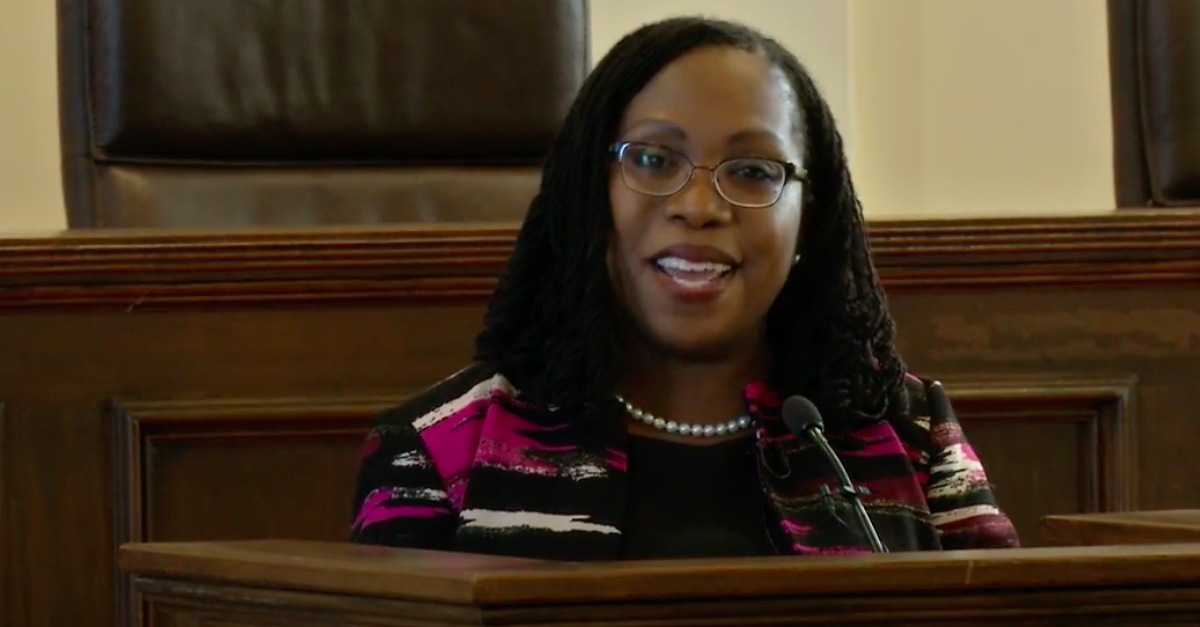
Fulfilling a promise that his next Supreme Court nominee would vie for the position of the nation’s first Black female justice, President Joe Biden nominated U.S. Circuit Judge Ketanji Brown Jackson to the high court on Friday.
“Judge Jackson is an exceptionally qualified nominee as well as an historic nominee, and the Senate should move forward with a fair and timely hearing and confirmation,” the White House wrote in a statement.
Senate Majority Whip Dick Durbin (D-Ill.), who serves as chair of the Senate Judiciary Committee, applauded Jackson’s selection.
“From a strong list of prospective candidates, President Biden has chosen an extraordinary nominee in D.C. Circuit Judge Ketanji Brown Jackson,” Durbin wrote in a statement. “To be the first to make history in our nation you need to have an exceptional life story. Judge Jackson’s achievements are well known to the Senate Judiciary Committee as we approved her to the D.C. Circuit less than a year ago with bipartisan support. We will begin immediately to move forward on her nomination with the careful, fair, and professional approach she and America are entitled to.”
Jackson has risen quickly through the ranks, receiving a promotion just last year to the D.C. Circuit Court of Appeals after eight years as a district court judge first nominated to the federal bench by Barack Obama.
Twice confirmed by the Senate, Jackson won the support of three Republicans just last year, when she ascended to the D.C. Circuit on a 53-to-44 vote. Those GOP Senators—Susan Collins of Maine, Lindsey Graham of South Carolina and Lisa Murkowski of Alaska—will be under pressure to vote for her again.
Sen. Graham, who supported the nomination of U.S. District Judge J. Michelle Childs, reacted to the Friday reports by dramatically reversing his previous approval of Jackson. Now, Graham describes her nomination as evidence the “radical Left” swayed Biden’s decision-making “yet again.”
I expect a respectful but interesting hearing in the Senate Judiciary Committee.
The Harvard-Yale train to the Supreme Court continues to run unabated.
— Lindsey Graham (@LindseyGrahamSC) February 25, 2022
Graham, adding that he expects a “respectful but interesting” Senate Judiciary Committee hearing, took a swipe at Jackson’s Harvard Law educational background.
The federal appellate court in the nation’s capital is widely viewed as a proving ground for potential justices.
An historic choice in terms of the diversity of the Supreme Court bench, Jackson also brings a legal background Biden has been eager to elevate: that of a former federal public defender. The traditional path to judgeships has been from the post of a prosecutor, in what criminal justice reform advocates warn has led to a lopsided system. The 51-year-old’s resume boasts much to rectify that perceived imbalance. Jackson previously served as a Senate-confirmed Commissioner and Vice Chair of the United States Sentencing Commission. Before that appointment, she was of counsel at the law firm Morrison & Foerster LLP between 2007 and 2010. Her career in private practice was preceded by two years as a federal public defender in Washington. She previously served as assistant special counsel on the Sentencing Commission between 2003 and 2005.
Earlier in her career, she clerked for the retiring Supreme Court justice she seeks to replace: Stephen Breyer.
According to her White House biography, Jackson’s high school guidance counsel once tried to tamp down her ambitions in her teenage years, advising that the child of parents from the segregated South should not set her sights “so high.” She did not listen, applying—against the counselor’s advice—and ultimately enrolling in Harvard. She graduated that school magna cum laude, graduated Harvard Law School cum laude, and edited the Harvard Law Review.
Since becoming a D.C. Circuit judge, Jackson was on the panel that rejected former President Donald Trump’s effort to block scrutiny of records sought by the House Committee to Investigate the Jan. 6 Attack on the U.S. Capitol. The three-judge panel unanimously rejected Trump’s claims of executive privilege over the files, reminding Trump: “We have one president at a time.” And that president, Biden, found the documents were not privileged. The Supreme Court upheld that ruling on appeal.
On the district court bench, Jackson penned stinging rulings against Trump, telling the administration that its “expedited removal” bid to deport undocumented immigrants “reeks of bad faith.” She also ordered Trump’s ex-White House counsel Don McGahn testify in the former president’s impeachment, adding that the constitutional separation of powers protects the United States from “tyranny.”
“In reality, it is a core tenet of this Nation’s founding that the powers of a monarch must be split between the branches of the government to prevent tyranny,” she wrote in November 2019, as the impeachment probe hit Capitol Hill. “Thus, when presented with a case or controversy, it is the Judiciary’s duty under the Constitution to interpret the law and to declare government overreaches unlawful. Similarly, the House of Representatives has the constitutionally vested responsibility to conduct investigations of suspected abuses of power within the government, and to act to curb those improprieties, if required. Accordingly, DOJ’s conceptual claim to unreviewable absolute testimonial immunity on separation-of-powers grounds–essentially, that the Constitution’s scheme countenances unassailable Executive branch authority–is baseless, and as such, cannot be sustained.”
The D.C. Circuit ultimately overruled that decision, before the case was reheard by the court’s full en banc bench, which reinstated the House’s ability to sue to enforce the subpoena in August 2020. The circuit ultimately rejected the House’s bid later that month.
After a two year back-and-forth court fight, McGahn ultimately testified last year.
(Photo via YouTube screenshot)
Have a tip we should know? [email protected]